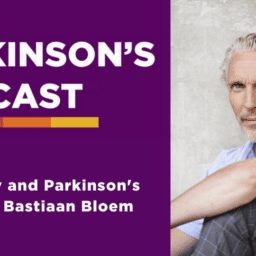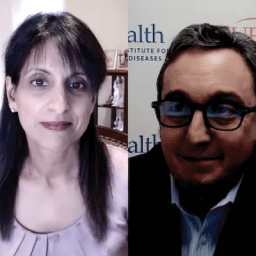Professor Bastiaan Bloem is a medical director and consultant neurologist at the Department of Neurology, Radboud University Medical Centre, Nijmegen, The Netherlands. He recently sat down with us to share his thoughts on what he calls “the Parkinson’s Pandemic” and why he believes “this is a time for hope” for people living with Parkinson’s.
You can watch the interview below.
SHOW NOTES
- Parkinson’s is the fastest growing neurological condition in the world, in part because people are living longer. If you correct for aging, however, you can see that although the number of people with conditions such as Alzheimer’s remain stable or even decline, the one neurological condition that continues to accelerate is Parkinson’s.
- Professor Bloem believes this acceleration is due to environmental toxins, pesticides in particular.
- Paraquat, a highly toxic weed killer that has been banned in more than 60 countries but is still used in the US, is a complex 1 inhibitor and is very toxic to the area of the brain that Parkinson’s impacts, the substantia nigra.
- Pesticide use began being used worldwide in the 1950s to feed a rapidly growing world population. People can be exposed to pesticides through well water, as well as through the food chain. Because milk in particular has been found to contain high concentrations of pesticides, many Parkinson’s researchers including Professor Bloem believe avoiding or limiting dairy may help prevent Parkinson’s.
- Daily exercise seems to protect against development of Parkinson’s, as does following a Mediterranean diet, eating dark fruit, and consuming coffee.
- In one of Professor Bloem’s recent studies, his team found that exercising three times a week for 30 minutes at 80% your maximum capacity can stabilize Parkinson’s motor symptoms.
- In a paper currently under review, his team shares data from a brain scan study, which showed how the brains of members of a group who did stretching exercises shrank over six months’ time, while the brains of a cycling exercise group not only did not shrink but also showed new connections between the diseased basal ganglia and the healthy cortex.
- People who live well with Parkinson’s, Professor Bloem says, are people who accept it and learn to work with it. “People who after a period of sorrow and despair say, ‘Hang on. It’s there. I’m going to accept the fact that it’s there, and I’m going to get on with my life,’ are the people who live well.”
- Optimism and hope are important. “This is a time for people with Parkinson’s to have hope,” Professor Bloem says. “Parkinson’s today is a different Parkinson’s than it was 10 years ago. We have better research, we have better drugs, we better understand deep brain surgery. There are 10, 20, 30 drugs in the pipeline that could slow Parkinson’s.”
- In the US, one in three people with Parkinson’s do not have access to a neurologist. In an ideal world, Professor Bloem says, each person with Parkinson’s would have access to multi-disciplinary care that is personalized. Each would have a neurologist who is supported by a Parkinson’s nurse and a general practitioner supported by a community nurse. A second ring of the wellness team would include physical, occupational, and speech-language therapists; dietitians; rehabilitation specialists; sleep specialists. An outer circle would include specialists like gastroenterologists, ophthalmologists, urologists, and dentists who understands Parkinson’s.
- Parkinson’s is different for every single person. The needs and wishes of each person with Parkinson’s are different. The way Parkinson’s presents itself is different. There are at least eight genes involved, plus a range of environmental factors, plus a range of unknown factors.
- Nurses are powerful members of care teams and can be strong liaisons between hospitals and medical offices and the community. Nurses can be the first line of access, and if the concern is a problem they cannot solve, they know who on the team can.
- People with Parkinson’s benefit greatly from daily exercise. Dr. Bloem says there are four primary reasons exercise is crucial for everyone, especially people with Parkinson’s:
1. Exercise helps your heart, brain, bone density, lungs, and more.
2. Exercise may prevent Parkinson’s.
3. If you have Parkinson’s, exercise works like a medication. It is continually proven by research that exercise suppresses symptoms of Parkinson’s.
4. It is currently believed that if anything can slow the progression of Parkinson’s, it’s regular exercise.
ABOUT BASTIAAN BLOEM
Dr. Bloem received his medical degree with honors at Leiden University Medical Centre in 1993 and obtained his PhD in 1994. He received additional training as a movement disorders specialist during fellowships at The Parkinson’s Institute in Sunnyvale, CA, and at the Institute of Neurology in Queen Square, London. In September 2008, he was appointed professor of neurology, with movement disorders as a special area of interest.
In 2002, Dr. Bloem founded and became medical director of the Parkinson Centre Nijmegen (ParC), which was recognized from 2005 onwards as a center of excellence for Parkinson’s. Together with Dr. Marten Munneke, he also developed ParkinsonNet, an innovative healthcare concept that now consists of 70 professional networks for people with Parkinson’s, covering all of The Netherlands.
Dr. Bloem recently co-authored Ending Parkinson’s Disease: The Book with Dr. Michael Okun, Dr. Ray Dorsey, and Todd Sherer, PhD. It can be purchased at several online bookstores.









